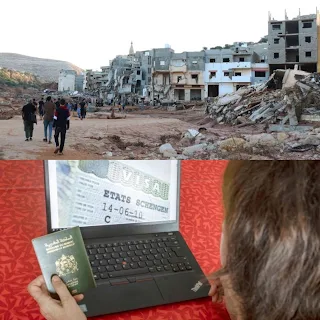The Libyan Public Prosecutor's Office announced, on Monday, the arrest of eight officials responsible for managing dam facilities, including the mayor of the city of Derna, following the floods caused by Storm Daniel two weeks ago in Libya, leaving more than 3,800 dead.
The Libyan Public Prosecutor on Monday issued an arrest warrant for eight officials as part of an investigation into the flood disaster that claimed the lives of thousands in eastern Libya.
The Public Prosecutor's Office stated in a statement that the officials were arrested on suspicion of mismanagement and negligence, and they currently work or have previously worked in offices responsible for water resources and dam management.
Among those included in the arrest warrant was the mayor of Derna, Abdel Moneim Al-Ghaithi, who was dismissed along with other members of the municipal council after the disaster.
In the statement, the Public Prosecutor considered that their mistakes contributed to a catastrophic loss of flood victims as a result of negligence.
Regarding the mayor, the statement said that he did not bring up “what is motivated by the reality of his abuse of the authority of his position and his deviation from the obligations of the mandate of managing the funds allocated for the reconstruction and development of the city of Derna.”
On September 10, Hurricane Daniel swept several areas in eastern Libya, most notably the cities of Benghazi, Al-Bayda, Al-Marj, and Sousse, in addition to other areas, including Derna, which was the most affected, leaving thousands dead and missing, in addition to significant material damage.
On the 18th of the same month, the Libyan government appointed by the House of Representatives announced the dismissal of the entire municipal council of the city of Derna and referring its members to investigation, following angry demonstrations that took place in Derna to demand that those responsible be held accountable for their negligence in not maintaining the city’s dams that collapsed.
Morocco : An electronic campaign demanding the imposition of visas on the French
Rabat : The hashtag “Apply visas to the French” topped the most popular list on the “X” platform in Morocco, amid the continuing crisis between the two countries and Paris tightening the conditions for granting visas to Moroccans.On September 28, 2021, the French government announced the tightening of conditions for granting visas to citizens of Morocco, Algeria, and Tunisia. Claiming that “the three countries refused to issue the necessary consular permits to take back (irregular) immigrants from their citizens.”On the same day, Moroccan Foreign Minister Nasser Bourita denounced France’s decision to tighten the conditions for granting visas to his country’s citizens, describing it as “unjustified.”In a tweet on the X platform, Moroccan activist Simo Ben called for imposing a visa on French tourists.He added in his tweet that his country “attracts many tourists from different continents, and it is possible to do without French tourists.”In turn, Aisha Mina agreed with “Simo Ben” on the necessity of imposing a visa on the French, saying in her tweet: “This demand comes due to France’s hostile actions towards Morocco.”
On Facebook, Ahmed Al-Qari said in a blog post that “Moroccan feelings are running high against France’s policies of control and arrogance towards Morocco.”He continued: “This is the best time to explain the harms of Frenchness, its dangers, and its serious impact on education, services, and the economy in Morocco.”In turn, Yassin Al-Haddad, in a tweet on Facebook, called for the need to support this campaign.
This electronic campaign comes days after a speech addressed by French President Emmanuel Macron to Moroccans, which sparked a state of controversy and dissatisfaction among them.After the earthquake that struck Morocco on September 8, with a magnitude of 7 on the Richter scale, Paris offered to help Rabat in rescue efforts, but the latter only accepted help from 4 countries: Britain, Spain, Qatar, and the Emirates, which was understood to be the rejection of the rest of the offers. Including France.Rabat’s position on French aid sparked great controversy in the European country, prompting President Macron to publish a video speech on the “X” platform directed to Moroccans.
Although Macron acknowledged in his speech that organizing aid is a sovereign decision of King Mohammed VI and the Moroccan government, his address directly to the Moroccan people sparked a widespread wave of dissatisfaction in Moroccan circles, which considered his speech “nostalgia for the colonial era.”With France's decision to tighten its restrictions on granting visas to Moroccans, public tension between the two countries emerged and was reinforced by the non-exchange of diplomatic visits, as the last visit of French Foreign Minister Catherine Colonna was in December 2022. Also, since last October, Rabat has not appointed an ambassador. New to Paris, succeeding Ambassador Mohamed Benchaaboun, who was appointed by the Moroccan King to head the Mohammed VI Investment Fund.




Informative
ReplyDelete